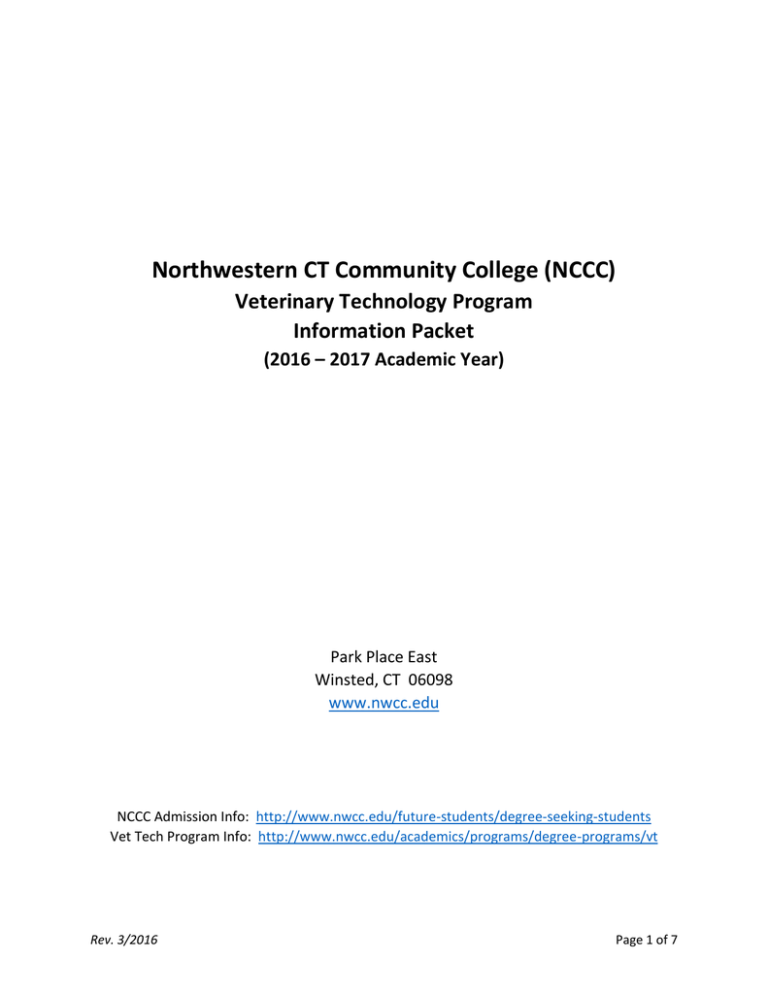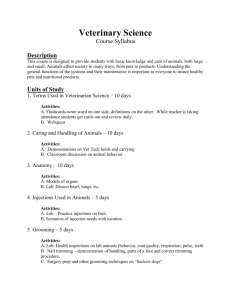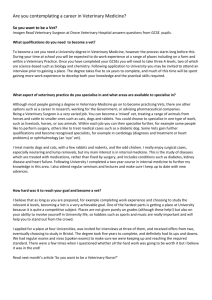Northwestern CT Community College (NCCC) Veterinary Technology Program Information Packet
advertisement

Northwestern CT Community College (NCCC) Veterinary Technology Program Information Packet (2016 – 2017 Academic Year) Park Place East Winsted, CT 06098 www.nwcc.edu NCCC Admission Info: http://www.nwcc.edu/future-students/degree-seeking-students Vet Tech Program Info: http://www.nwcc.edu/academics/programs/degree-programs/vt Rev. 3/2016 Page 1 of 7 Introduction The NCCC Veterinary Technology Program is fully accredited by the American Veterinary Medical Association (AVMA). Graduates are prepared for immediate employment in veterinary offices, biological research facilities, drug and feed manufacturing companies, and in the animal production industry. Students who successfully complete the program will be awarded an Associate in Science Degree in Veterinary Technology. The program provides the classroom, laboratory, and field experience that will prepare students to be job entry-level competent. It promotes graduate success through a combination of challenging studies, extensive on-site hands-on learning opportunities, affiliations with off-site veterinary clinics, and continued emphasis on the need for lifelong learning. Students may attend the NCCC Vet Tech Program on either a full-time or part-time basis. Full-time students can complete the program in two academic years (including a summer semester). Part-time students must complete all the Veterinary Technology and Biology (VET* and BIO* designated) courses within a five-year time frame. After completing the Associate Degree program, eligible students may transfer seamlessly to the College of Agriculture and Natural Resources at the University of Connecticut to major in either Animal Science or Pathobiology. The only students eligible to register for VET* designated courses at NCCC are those that have been formally accepted into the Veterinary Technology Program. Application Process Prospective students are required to submit an application for acceptance into the NCCC Veterinary Technology Program. Application forms are available on the NCCC website at http://www.nwcc.edu/academics/programs/degree-programs/vt. The application deadline is May 31, 2016 for admission to the Fall 2016 Semester. Applications may not be submitted until final grades for prerequisite courses are available for review. All prospective students must have completed the following before their application will be considered: Application and acceptance to NCCC as a Pre-Vet Tech student Submission of official transcripts for all previous college-level course work at institutions other than NCCC Evaluation and entry of any transfer credits (after official transcripts are received) by the NCCC Admissions Office (860-738-6330). Transfer credits which meet program prerequisite or general education requirements will be accepted. A minimum grade of “C” is required for all transfer credits and grades from colleges and universities not regionally accredited will not be accepted. Rev. 3/2016 Page 2 of 7 Eligible students will be contacted to schedule an interview with a Veterinary Technology faculty member after their application packet has been evaluated. Interviews will be scheduled between June 6, 2016 and June 15, 2016. Students will be informed of their program acceptance status at the completion of their interview. If, after this initial application process, space remains in the NCCC Veterinary Technology Program for Fall 2016, applications will be accepted again in late summer. If this situation occurs, information and deadline dates will be posted on the NCCC website at http://www.nwcc.edu/academics/programs/degree-programs/vt. Application Requirements The NCCC Vet Tech Program has four courses as program prerequisites (i.e., courses that must be successfully completed before acceptance into the Vet Tech program): BIO* 121 – General Biology CHE* 111 – Concepts of Chemistry CSA* 105 – Introduction to Software Applications MAT* 137 – Intermediate Algebra Successful completion of these prerequisites means that the student obtained a grade of “C” or higher. BIO* 121 and CHE* 111 must be college-level courses and must be taken within the 5 years prior to acceptance into the Vet Tech Program. CSA* 105 ONLY – Students have the option to substitute a Passing Score on the NCCC Computer Proficiency Test (CPT) for completion of this course. Information regarding the CPT is available at http://www.nwcc.edu/academics/programs/degree-programs/vt/Computer-Proficiency-Test. MAT* 137 ONLY – Students have the option to substitute a Satisfactory Score on a Math Placement Test for completion of this course. Students should contact the NCCC Admissions Office for information on Placement Testing. Prior to application to the NCCC Veterinary Technology Program, it is strongly recommended that applicants experience 20 hours or more of job shadowing of a Veterinary Technician at a veterinary clinic. Careers in veterinary medicine can be high stress positions and the NCCC Veterinary Technology Program is academically challenging. It is essential for student success that individuals are sure that this is an appropriate career choice for them. Rev. 3/2016 Page 3 of 7 Applicants are required to submit a typed, 1-2 page, double-spaced essay with their application. This essay should state the applicant’s goals and reasons for entering the Veterinary Technology program, document past experience with animal care and/or veterinary medicine and describe the recommended job shadowing. Students seeking transfer from another Veterinary Technology Program will be considered on an individual basis and are not guaranteed acceptance. Program Academic Requirements A minimum grade of “C” (2.00) is required in all VET* designated courses. Students that earn a grade of “C-“ or lower, including grades of “W”, will only be allowed to repeat a class one time. Students who do not earn an acceptable grade of “C” after two attempts at a VET* designated course will be dropped from the NCCC Veterinary Technology Program. All VET* and BIO* designated courses (within the program) must be completed within 5 years of graduation. The NCCC Veterinary Technology Program is time intensive. Full-time students should expect to spend 17-24 hours per week in class. Students should plan to spend 3 hours of preparation (reading, studying, completing assignments and projects) for each hour spent in class. In addition, the program requires completion of two off-campus externships of 150 and 200 hours, respectively. Program Health / Vaccination Requirements For any VET* designated courses numbered 150 or higher (excluding VET* 201 & VET* 202), a health physical and rabies vaccination certificate are required. Health physical forms will be provided to students in the NCCC Veterinary Technology Program during the semester prior to their enrollment in courses where required. Students must be in overall good health, test negative for tuberculosis, and must be capable of lifting a minimum of 50 lbs. It is strongly advised that all students should be current on their tetanus vaccination. Pre-exposure rabies vaccination is required for student protection because, for clinical labs, the NCCC Veterinary Technology program utilizes shelter animals for which vaccination history is unknown. Rev. 3/2016 Page 4 of 7 Clinical labs also present hazards for veterinary technology students including, but not limited to, injury related to animal handling, exposure to diagnostic radiation, exposure to gas anesthetic agents, and exposure to zoonotic diseases (transmissible from animals to humans). These hazards are of particular concern during pregnancy. NCCC will not accept liability if a student chooses to disregard the possible hazards during pregnancy. Therefore, pregnant students may only participate in clinical labs as permitted by their personal physicians. Approximate Costs Current detailed tuition rates are available at http://www.ct.edu/admission/tuition. As of the Fall 2015 Semester, the estimated total cost of tuition and college fees for an in-state, full-time student completing the program in two years is $12,000 (including summer courses and program prerequisites). Total costs will be higher for part-time students, out-of-state students, and students required to repeat courses due to poor academic performance. It is recommended that students purchase and keep their textbooks (as opposed to renting them or selling them back to a bookstore after course completion) because many of them will provide good references for the duration of their studies and career. Also, students are required to purchase and wear scrubs for their clinical labs. Students often choose to purchase personal equipment such as a stethoscope during their studies. Students should expect a cost of approximately $4,000 for textbooks, scrubs, and other supplies. The cost of the required health physical and rabies vaccination is estimated at $1,200. The rabies vaccinations cost approximately $300 per dose and three doses are required to complete the preexposure series. Students are encouraged to check with their personal health insurance provider to determine if the health physical and rabies vaccinations expenses qualify for insurance coverage. Rev. 3/2016 Page 5 of 7 Program of Study The following is the suggested academic plan for full-time students who aim to graduate in two years. Students considering variation from this plan should refer to the NCCC Course Catalog for detailed information on specific course prerequisites and should discuss the modified academic plan with an NCCC Vet Tech Academic Advisor. Course # Course Title Credits SEMESTER 1 (Fall) ENG* 101 MED* 125 VET* 100 VET* 101 VET* 201 Composition Medical Terminology Introduction to Animal Care Introduction to Veterinary Technology Veterinary Anatomy & Physiology I (with Lab) 3 3 2 3 4 SEMESTER 2 (Spring) VET* 102 VET* 151/151L VET* 152/152L VET* 202 VET* 250 Vet Office Management & Communication Small Animal Veterinary Technology Large Animal Veterinary Technology Veterinary Anatomy & Physiology II (with Lab) Principles of Pharmacology – Vet Tech 3 4 4 4 3 SUMMER / INTERSESSION PSY* 111 VET* 280 General Psychology I Veterinary Technology Externship I 3 1 SEMESTER 3 (Fall) VET* 205/205L VET* 212 VET* 230/230L VET* 240 MAT* Veterinary Lab Procedures Principles of Imaging Veterinary Anesthesia & Surgical Nursing Periodontology & Oral Radiology Mathematics Elective 3 1 4 2 3 SEMESTER 4 (Spring) BIO* 235 VET* 220 VET* 238 VET* 281 ELECTIVE ELECTIVE Microbiology Animal Pathology Parasitology Veterinary Technology Externship II Social Science Elective Humanities or Arts Elective 4 3 3 2 3 3 TOTAL CREDITS Rev. 3/2016 68 Page 6 of 7 Veterinary Technician National Exam (VTNE) Students who receive an Associate of Science Degree in Veterinary Technology from NCCC are qualified to sit for the VTNE. The VTNE is used to evaluate entry-level veterinary technicians' competency to practice and to be credentialed. Veterinary technician credentialing is currently optional (i.e., not legally required) in the State of Connecticut. However, as of June 2015, credentialing is legally required for veterinary technicians in the majority (37 out of 50 states) of the USA and voluntarily encouraged in 10 other states. Because the VTNE is used as a part of either required or voluntary credentialing in all but 6 US states or territories (including CT), NCCC strongly encourages its Veterinary Technology graduates to sit for the VTNE soon after graduation. Obtaining a passing score on the VTNE gives graduates the flexibility to obtain certification in other states, besides CT. Rev. 3/2016 Page 7 of 7





